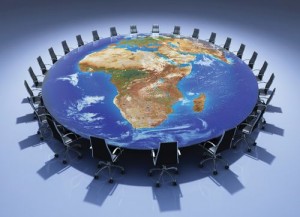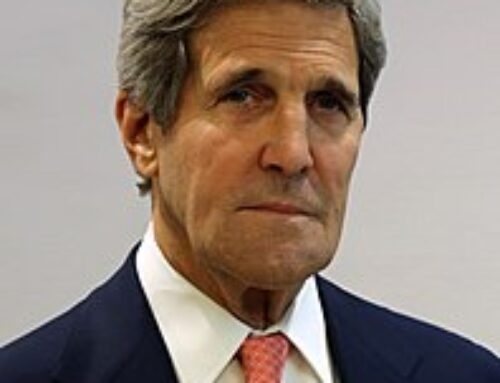 The article, which appeared in a respected American Catholic magazine, focused on “global consciousness,” and linked that concept to the ideals of universal brotherhood, love, solidarity, and unity among nations. It also mentioned a number of organizations, in particular the United Nations, that have worked to achieve those ideals, and it ended by urging every person to “embrace a global identity.”
The article, which appeared in a respected American Catholic magazine, focused on “global consciousness,” and linked that concept to the ideals of universal brotherhood, love, solidarity, and unity among nations. It also mentioned a number of organizations, in particular the United Nations, that have worked to achieve those ideals, and it ended by urging every person to “embrace a global identity.”
Accompanying the article was a side panel summarizing international polls on the subject of expanding U.N. powers. “Large majorities around the world support giving the U.N. a variety of expanded powers,” the statement began, and it went on to specify “giving the U.N. the authority to go into countries to investigate violations of human rights” and “the power to regulate the international arms trade,” and having the U.N. monitor elections in countries where “there are concerns about the fairness of elections.” (Would Florida in 2000 have qualified for U.N. involvement?)
Like individuals from most religious traditions, and many non-religious individuals, I support universal brotherhood, love, solidarity, and unity among nations. But before extending that support to “global consciousness” or “global identity,” I wanted to examine the concepts more closely. I began by visiting the source of the side panel information, Worldpublicopinion.org. Their mission is summed up in their name, and their directors, researchers, and advisory board members seem well credentialed. Their financial support derives from eighteen philanthropic foundations, two-thirds of which are classified by the monitoring group Discoverthenetworks.org as providers of “financial backing for leftwing groups and causes.” This fact may cause one to raise an eyebrow, but it does not disprove the statistics that show wide support for expanding U.N. powers. So perhaps the statistics are accurate.
But even if a majority of people in the world want U.N. powers expanded, the question remains Is that a good idea? Majorities, after all, can be wrong.
Dominican theologian Ignace Berten has suggested that there are three mistakes one can made about globalization: to be indifferent to it, to canonize it, or to demonize it. The observation is astute, but I believe one of those mistakes is more tempting for the Church that the other two, and that one is canonizing globalism. I say this because advocates of giving the U.N. global powers make their case largely in terms that sound biblical—notably, love and unity—and such terms have a powerful appeal to Christians. So powerful, in fact, that they can short-circuit thoughtful analysis and thus block discernment.
I believe that giving the U.N. global powers is not a good idea, for several reasons. First, investing such power in the U.N. would violate the principle of subsidiarity, which the (Catholic) Acton Institute calls “a bulwark of limited government and personal freedom.” This principle, as applied to government, holds that, except in unusual circumstances, governmental tasks should be performed by the governmental agency closest to the people. In our system, that means the federal government should do nothing that can be done as well by the state, the state should do nothing that can be done as well by the county, and the county should do nothing that can be done as well as the local community. Following this principle has historically been less expensive and more efficient.
The principle of subsidiarity was conceptualized by Pope Leo XIII and reaffirmed by a number of his successors.
- In Quadragesimo Anno, Pius XI declared, “Just as it is gravely wrong to take from individuals what they can accomplish by their own initiative and industry and give it to the community, so also it is an injustice and at the same time a grave evil and disturbance of right order to assign to a greater and higher association what lesser and subordinate organizations can do.”
- In Pacem in Terris, John XXIII said, “But it is no part of the duty of universal authority to limit the sphere of action of the public authority of individual States, or to arrogate any of their functions to itself. On the contrary, its essential purpose is to create world conditions in which the public authorities of each nation, its citizens and intermediate groups, can carry out their tasks, fulfill their duties and claim their rights with greater security.”
- In Centesimus Annus, John Paul II, affirmed that “A community of a higher order should not interfere in the internal life of a community of a lower order, depriving the latter of its functions, but rather should support it . . . always with a view to the common good.”
- In Caritas in Veritate, Benedict XVI termed subsidiarity “the most effective antidote against any form of all-encompassing welfare state.”
Some might argue that the principle of subsidiarity applies to nations, and the U.N. is not a nation but instead a consortium of nations. This is a distinction without a difference. In fact, the principle has special application in the case of global government because transferring the collective power of many nations to a consortium would, in effect, make it a super-nation.
A second reason U.N. powers should not be expanded is that though the U.N. has done some good—notably delivering aid in natural disasters, advocating for human rights, and providing a forum for discussing issues of international concern—it is in many ways a flawed organization.
Alan Dershowitz, Elie Wiesel and Bayard Rustin, for example, cite many examples of anti-Semitism in the U.N. Others have pointed out that the U.N. supports “national liberation movements” selectively; for example, supporting Palestinians but not Tibetans, Kurds, or Turkish Armenians. Federal Reserve Chairman Paul Volcker found serious flaws in U.N. oversight of the “Oil-for-Food” program. And U.N. peacekeeping forces have been associated with sexual abuse and child prostitution.
In a 2005 report the U.N. itself acknowledged a number of its deficiencies. It claimed its deliberative process is too slow, its General Assembly agenda needs streamlining, its Economic and Social Council needs revamping, its Commission on Human Rights suffers from declining credibility and professionalism and is in “need of major reform,” and its Office of Internal Oversight needs to be reviewed “to strengthen its independence and authority.”
But perhaps the most serious flaw of the U.N. is that fewer than half of its member nations are democracies. Giving the U.N. expanded control would be tantamount to giving autocrats, and in some cases tyrants, power over free peoples. The prospect of that development gives new meaning to the question first framed by the Roman poet Juvenal: Quis custodiet ipsos custodes? That is, “Who watches the watchmen?”
A third reason for denying the U.N. the powers specified above is that the idea derives from a relativistic view of nations—the view that no nation is built on a stronger intellectual and moral foundation than any other. That notion requires us to believe that there is no substantive difference between the governing philosophies of Israel and Iran, Canada and Cuba, or North and South Korea. It also suggests that contemporary Germany is no different from Nazi Germany, or contemporary Japan from Imperial Japan. Such notions are absurd.
Some governing philosophies are demonstrably superior to others. The question of which philosophy is best is difficult to answer because each nation tends to be biased in favor of its own. But it can be answered by comparing the underlying principles of the various systems of government and determining which are more intellectually and morally sound.
Many Americans are biased against their own heritage rather than in favor of it. This is ironic because a strong argument can be made that the founding documents of the United States are the wisest ever conceived. Indeed, they have often been described as inspired in the deepest meaning of the term. Consider, for example, the concepts that “all men are created equal,” that they possess specific rights not from the State but from the Creator, that their rights are “inalienable,” and that to be legitimate, government must have “the consent of the governed.” These are historic ideas that go beyond defining government and underscore profound human values.
In conclusion, for any nation to surrender its sovereignty to a consortium such as the U.N. would be a mistake. For a democratic nation to do so would be a tragedy. Americans, in particular, should realize that being blessed with such inspired foundational principles, they have the responsibility to honor them in their lives and to be an example to others who seek to improve themselves and their nations. And Catholics and other Christians should focus on practicing the ideals of brotherhood, love, solidarity, and unity in their personal lives—as the Gospel directs them—rather than on institutionalizing them at some utopian global level.
Copyright © 2012 by Vincent Ryan Ruggiero. All rights reserved


